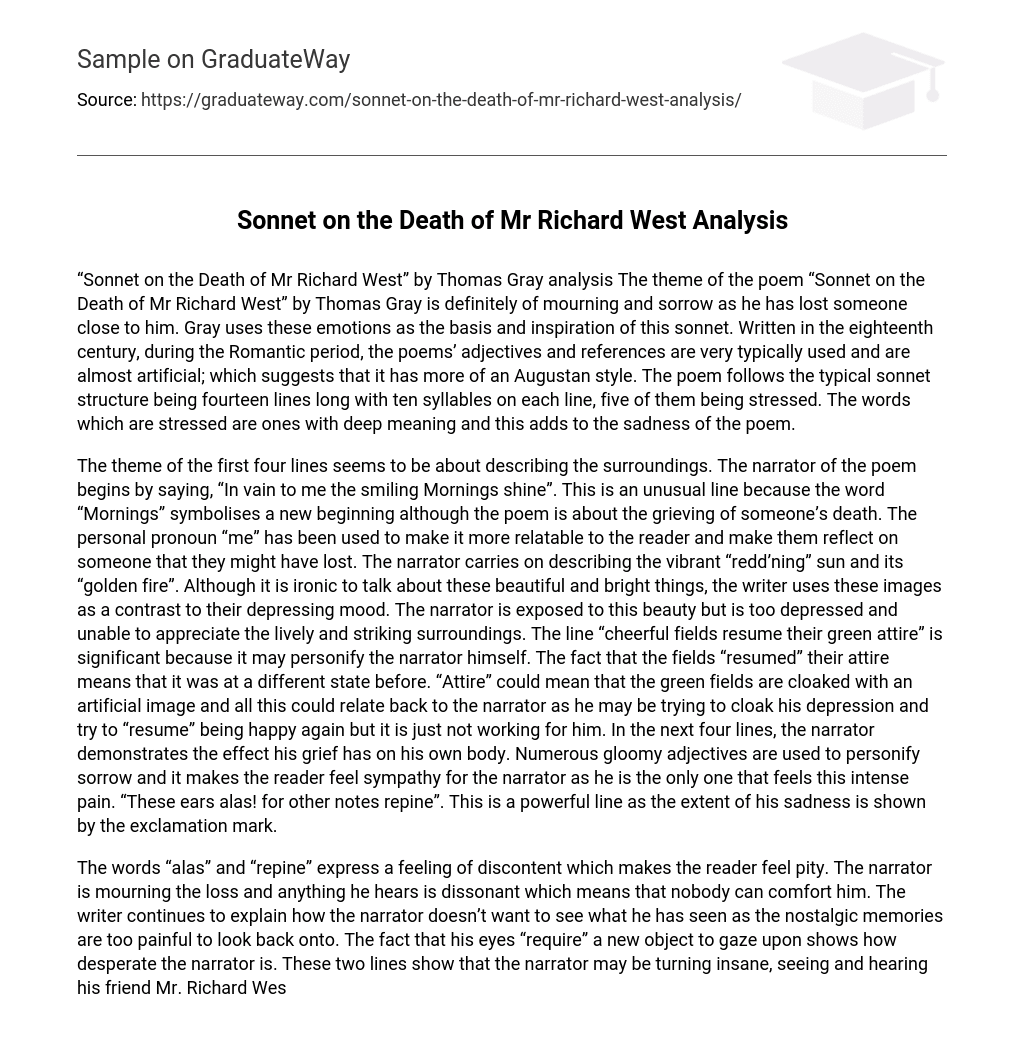“Sonnet on the Death of Mr Richard West” by Thomas Gray analysis The theme of the poem “Sonnet on the Death of Mr Richard West” by Thomas Gray is definitely of mourning and sorrow as he has lost someone close to him. Gray uses these emotions as the basis and inspiration of this sonnet. Written in the eighteenth century, during the Romantic period, the poems’ adjectives and references are very typically used and are almost artificial; which suggests that it has more of an Augustan style. The poem follows the typical sonnet structure being fourteen lines long with ten syllables on each line, five of them being stressed. The words which are stressed are ones with deep meaning and this adds to the sadness of the poem.
The theme of the first four lines seems to be about describing the surroundings. The narrator of the poem begins by saying, “In vain to me the smiling Mornings shine”. This is an unusual line because the word “Mornings” symbolises a new beginning although the poem is about the grieving of someone’s death. The personal pronoun “me” has been used to make it more relatable to the reader and make them reflect on someone that they might have lost. The narrator carries on describing the vibrant “redd’ning” sun and its “golden fire”. Although it is ironic to talk about these beautiful and bright things, the writer uses these images as a contrast to their depressing mood. The narrator is exposed to this beauty but is too depressed and unable to appreciate the lively and striking surroundings. The line “cheerful fields resume their green attire” is significant because it may personify the narrator himself. The fact that the fields “resumed” their attire means that it was at a different state before. “Attire” could mean that the green fields are cloaked with an artificial image and all this could relate back to the narrator as he may be trying to cloak his depression and try to “resume” being happy again but it is just not working for him. In the next four lines, the narrator demonstrates the effect his grief has on his own body. Numerous gloomy adjectives are used to personify sorrow and it makes the reader feel sympathy for the narrator as he is the only one that feels this intense pain. “These ears alas! for other notes repine”. This is a powerful line as the extent of his sadness is shown by the exclamation mark.
The words “alas” and “repine” express a feeling of discontent which makes the reader feel pity. The narrator is mourning the loss and anything he hears is dissonant which means that nobody can comfort him. The writer continues to explain how the narrator doesn’t want to see what he has seen as the nostalgic memories are too painful to look back onto. The fact that his eyes “require” a new object to gaze upon shows how desperate the narrator is. These two lines show that the narrator may be turning insane, seeing and hearing his friend Mr. Richard West and how it is addicting his senses. Gray’s Augustan style is seen on the next line. “My lonely anguish melts no heart but mine”. The melting of the heart is a very typical way to convey pain or a loss of love. Again strong words like “anguish”, which means suffering or being distressed, are used to give the poem the mourning feel. “Melts no heart but mine” means that he is the only one who understands and feels this pain, he can feel no joy and he is all alone in this situation. The poem leads onto the next set of lines which contains the narrator’s observations of other people and how their attitude contrasts to his. The line “new-born pleasure brings to happier men” is significant because the narrator is excluding himself from the group of “happier men”. This means that he is the one unhappy man and the whole sonnet shows his discomfort and inability to be happy. In this section of the poem, the writer uses more uplifting words such as “cheer”, “smiles”, “pleasure” etc. This shows how the poem reaches a phase of enlightenment because the descriptions change from sadness and loneliness to uplifting and healing. “Mornings” and “New-born pleasure” suggests a new beginnings and this might give the narrator hope to believe that there is a way to heal the pain by believing in or starting new things to keep his mind off the loss.
The theme of the poem has developed to a point of healing, now that the narrator has overcome the pain of the loss of his friend, he mourns for him, it is the last thing he can do before overcoming the loss. “I fruitless mourn to him that cannot hear” this suggests that although the narrator mourns the death of his friend, it may not live up to the respect that Mr. Richard West deserves and in a way demanded. The narrator’s loneliness is further emphasised as even Mr. Richard West cannot hear his mourning. “And weep the more, because I weep in vain” also shows the narrator’s anguish as his tears have no meaning, no matter how much he cries, the narrator believes that his actions are useless. This gives a more pure image about the narrator which contrasts to the artificial image of the melting heart. Although saddening, it brings to rest the poem and the mourning of the narrator. Although the main themes of the poem are sadness, loneliness and anguish, there is a significant build-up from theme to theme which gives the poem a unique touch. It is very relatable to the reader and the personal pronouns used make it more special to them. The poem also makes the reader feel sympathy for the narrator and informs the reader of his particular hardship.





